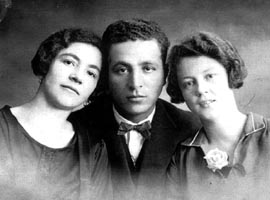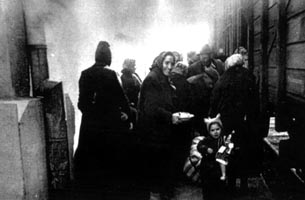|
The
Optimists
The Story of the Rescue of the Jews of Bulgaria |
Jacky
Comforty
|
|
USA 2000
|
 |
 |
| Delphi-Filmpalast 09.02
16.30 CinemaxX 3 10.02 10.00 CineStar 8 10.02 19.30 Kino Arsenal 11.02 12.45 Babylon 08.02 19.00 |
| Produktion: Comforty Media Concepts Weltvertrieb: Comforty Media Concepts 2145 Pioneer Road, Evanston, IL 60201 Tel: (847) 475-0791, (847) 269-2020 Buch: Jacky und Lisa Comforty Kamera: Yoav Ben David (Israel), Ivan Varimezov (Bulgaria), Syd Lubitsch (USA) Musik: Stuart Rosenberg Schnitt: Jacky Comforty, Lissa Oliver Format: 16mm, 1:1.37, Farbe Länge: 82 Minuten, 24 Bilder/Sek. Sprachen: Englisch, Hebräisch, Bulgarisch |
| Am 9. März 1943 kam die Polizei ins
Haus von Jacky Comfortys Familie in Bulgarien. Dies sollte der Anfang
vom Ende sein, der Beginn einer Reise nach Treblinka. Unter Waffengewalt
mußten Jackys Großeltern, seine damals fünfzehnjährige
Tante und sein Onkel, der gerade vier war, zu dem Deportationszentrum
in die Nachbarschule laufen. Jackys Vater, damals zweiundzwanzig,
war bereits in einem in der Nähe befindlichen Arbeitslager interniert.
Vier Mitglieder der Familie Comforty befanden sich unter den 8.500
bulgarischen Juden, die an diesem Tage auf Schulhöfe und andere
Sammelplätze in Bulgarien gebracht wurden, um zur Vernichtung
nach Polen deportiert zu werden. Dort warteten sie den ganzen Tag,
bis sie am Abend einfach nach Hause geschickt wurden. 50.000 Juden
lebten damals in Bulgarien. 50.000 Menschen mußten nicht sterben,
weil bulgarische Christen und Moslems Wege gefunden hatten, sie vor
ihren künftigen Mördern zu retten, ohne Rücksicht darauf,
daß ihre eigene Regierung mit den Nazis verbündet war.
„Wir wollten mit unserem dokumentarischen Projekt erforschen, wie diese verschiedenen ethnischen und religiösen Gruppen in Bulgarien selbst während des Holocausts in Frieden miteinander leben konnten, und welche Lehren man heute daraus ziehen kann.“ Jacky Comforty |
On 9 March 1943, police arrived at the
home of Jacky Comforty’s family in Bulgaria. This was to be the
beginning of the end, the start of the journey to Treblinka. At gunpoint
Jacky’s grandparents; his aunt, then fifteen years old; and his
uncle, age four, all marched to the deportation center set up at a
neighborhood school. Jacky’s father, 22 at the time, was not
at home when the police came. He had already been interned in a nearby
forced labor camp. The four Comfortys scheduled to depart for Poland
that day were among the 8,500 Bulgarian Jews targeted first for extermination.
Just a few days before, 11,343 Jews from neighboring Greece and Macedonia
had gone to their deaths. They had all lived in Bulgarian-controlled
territory ‘given’ to Bulgaria by Germany under the terms
of the alliance pact between the two countries. On 10 March, the Bulgarian
Jews were taken to schoolyards and other gathering places around Bulgaria
to await transport to additional trains. They waited all day. And
then, at the end of that day, they were simply sent home. Fifty thousand
Jews lived in Bulgaria. Fifty thousand people didn’t die because
Bulgarian Christians and Muslims found ways to protect them from their
would-be murderers even in defiance of their own Nazi-allied government.
”The purpose of our documentary project has been to explore how these different ethnic and religious groups came to live together in peace in Bulgaria even during the Holocaust and to learn how the lessons learned can be applied today. In Bulgaria, both organised efforts and individuals made a difference. The Bulgarian Parliament, Church, intellectuals, trade unions, professional guilds, and Jewish community all helped defeat the Nazis’ plans for mass deportations.“ Jacky Comforty |
| Jacky Comforty, geb. 1954 in Israel. Film- und Fernsehausbildung, Geschichtsstudium. Seit über zwanzig Jahren als Filmemacher in den USA, Deutschland und Israel tätig. Filme u.a. Inclusion High (2001), In the Shadow of Memory (1998), Step by Step: Heather’s Story (1996), Through a Glass, Lightly (1995). |